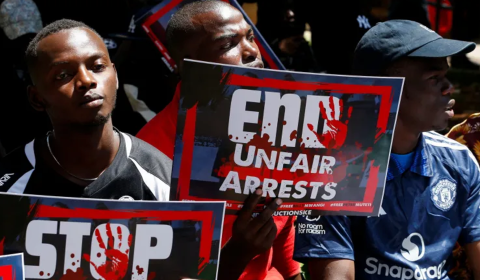In an interesting reversal of the typical watering down of social media, celebs recently found their attempts at self-promotion co-opted by something actually important.
There was a lot of confusion on Instagram recently after a spate of women began posting black and white selfies tagged ‘#challengeaccepted’. The now familiar mix of ubiquity and vagueness, implying exclusivity and inviting further investigation, suggested to Insta users that there was a new social change trend in town, in the vein of #BlackoutTuesday. They were right, sort of…
When I first saw the #challengeaccepted trend my confusion quickly gave way to anger. By the 29th of July, the day after the trend picked up speed, there were nearly 4 million photos uploaded under the hashtag, including posts by Cindy Crawford, Jennifer Garner, Kerry Washington, Florence Pugh, Kristen Bell, Eva Longoria, and, of course, the Kardashians.
https://www.instagram.com/p/CDJnHlQFuQi/?utm_source=ig_embed
Most of the pictures were flattering, heavily photoshopped and posed. A few vaguely gestured at some form of unspecified activism using the tag #womensupportingwomen, with a next nomination system creating a moralistic yet blatantly vainglorious daisy chain of conventionally beautiful women performing activism. It was an activism they didn’t even bother to specify, with many social media commentators pointing out that unlike the also widely criticised black tile movement, the trend wasn’t tied back to a specific movement. Amongst the milieu of pretty, smiling ladies, no practical way of ‘supporting’ other women, say, through donating to women’s shelters, was promoted.
I searched for even the most tokenistic unified message shoehorned into the fine print of Cindy Crawford’s ‘in my Calvins’-like beach photo to no avail. It was blatant self-aggrandisement at the worst possible juncture: the world was still in the grips of a pandemic and fighting for real, tangible change in the lives of black people through, crucially, social media.
But then, something interesting happened. After it became clear that the trend’s purpose was but a vacuous hole, real activists moved to fill it.
https://www.instagram.com/p/CDL3Oqqger0/?utm_source=ig_embed
Soon, posts started cropping up linking the #challengeaccepted movement to growing concerns over femicide (homicides with female victims) in Turkey. A tile by stopfemicides quickly went viral, urging non-Turkish users of the hashtag to acknowledge its origins and help expose its ‘true meaning’.
The thing is, before stopfemicides claimed #challengeaccepted as their own, the ‘movement’ had no connection to Turkey at all. In fact, representatives for the Council of Europe and Instagram announced they were unsure a black-and-white photo campaign on Turkish social media has anything to do with the worldwide ‘women supporting women’ challenge. Instagram later attributed the July 2020 uptick to a trend started in 2016 spreading awareness about breast cancer.




















